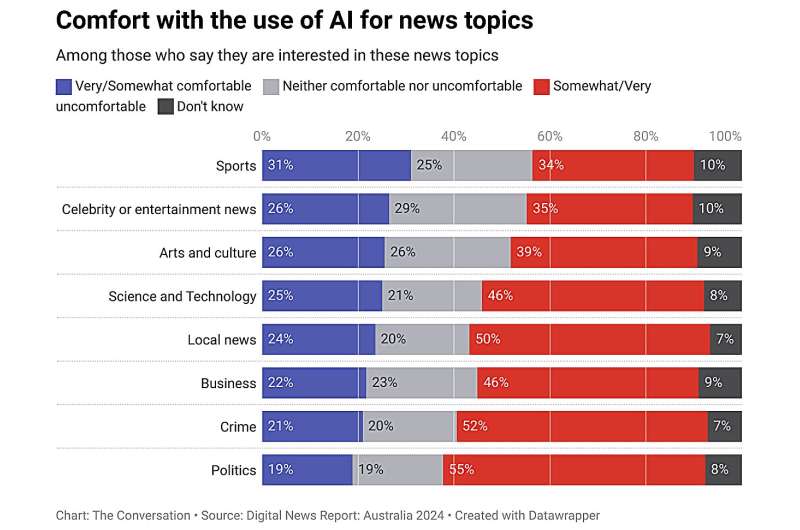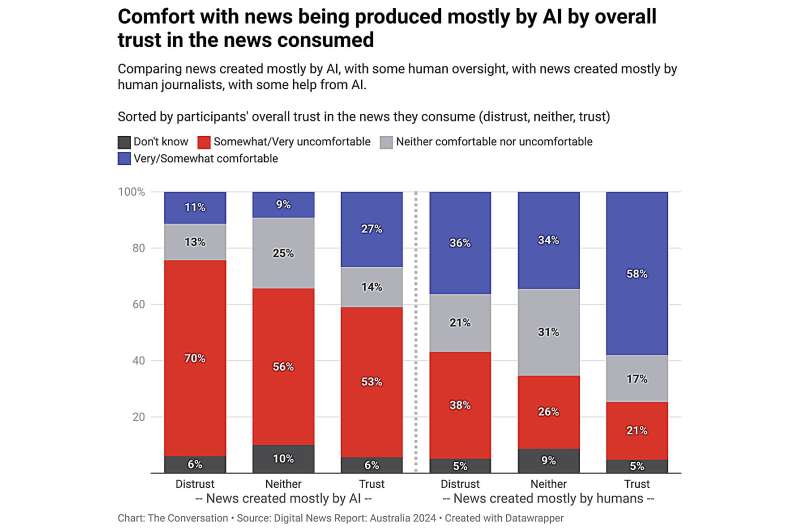This article has been reviewed according to Science X's editorial process and policies. Editors have highlighted the following attributes while ensuring the content's credibility:
fact-checked
trusted source
written by researcher(s)
proofread
Australians say AI shouldn't produce political news, but it's okay for sports

There has been a lot of hype about the emergence of generative AI products such as ChatGPT. Organizations, including news outlets, are rapidly adopting artificial intelligence technologies to boost productivity and creativity. Some news organizations are also cutting deals with AI companies to pay them for scraping their content.
But what does the public think about the increasing role of AI in the production of news?
This year's Digital News Report: Australia 2024 finds Australians prefer news that is made by humans, rather than AI, but the degree of discomfort depends on the topic.
The online survey of 2,003 adult Australians finds they are much more comfortable with sport (31%) and entertainment (26%) news being produced mainly by AI than with politics (19%) and crime (21%) news being produced the same way (see the chart below).
This suggests those who favor so-called "hard" news subjects are more skeptical about the use of AI in news and the impact it might have on the quality of news about important civic and social issues. Sports, lifestyle and culture news lovers are more relaxed about it, reflecting the different role these news genres play in people's lives.
But, overall, 59% say they feel uneasy about news produced by AI with human oversight. This is compared to 28% who say they are uncomfortable with news that is mainly produced by human journalists with AI assistance.
A lack of understanding about AI technology is a likely factor in people's discomfort with it. Only 44% say they know a moderate or large amount about AI. Those who know a fair bit (26%) are more likely to say they're comfortable with news produced mostly by AI, compared to those who only know a small amount (11%) or nothing at all (7%).
But awareness is also related to news consumption. Compared to heavy news users (51%), Australians who rarely or never access news are the least likely to be aware of AI technology (17%) and to be comfortable with news stories mostly produced by it (6%).

These findings suggest that attitudes towards AI in news may change over time as audiences become more familiar with it. They also highlight the important role news organizations can play in helping to explain how they use the technology.
People who trust news are more comfortable with AI
Transparency appears to be key. Our study found a link between people's comfort with the use of AI in news, their awareness of AI, and their trust in news. The more awareness they have about AI and the more they trust news, the more comfortable they are likely to be with its use in producing news.
One-quarter of people who trust the news they choose to consume say they are comfortable with it being produced mostly by AI, with human assistance. Conversely, those who distrust their news are the most likely to say they are somewhat or very uncomfortable with this scenario (70%).
For people who don't trust the news, the increasing use of AI may add another layer of uncertainty in an online environment in which it is already difficult to identify reliable information.
Given this strong link to trust in news, it is important that news organizations are open with their audience about how and why AI is being used to create news. While adopting AI technologies might reduce costs for news outlets, it would be counterproductive to do it at the price of trust in their news.
With the growth of AI news summaries, news brands need to do all they can to showcase their original and credible content to hold on to their paying audiences.
In its tenth edition, the Digital News Report: Australia 2024 also finds:
- heavy news consumption has risen to 51% compared to 48% in 2023, particularly among Gen Z women
- 41% say they have news fatigue (up from 28% in 2019)
- trust in news has remained steady, but distrust in news has risen consistently over the past ten years
- interest in news about the economy and mental health has risen since 2022
- social media are the main source of news for 60% of Gen Z (compared to 47% in 2023)
- the number of X (Twitter) users paying attention to mainstream news on X dropped to 49% (down 13 percentage points), while those paying attention to posts from ordinary people increased (47%, up 10 percentage points).
Provided by The Conversation
This article is republished from The Conversation under a Creative Commons license. Read the original article.![]()





















